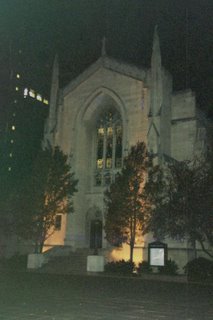The Frog Man of the Desert
This a great story from NPR - Read on (NPR's words):
If you can, take a break from the rigors of the job today and listen to a marvelous story from NPR's John Burnett, who was a visiting faculty for Poynter's Public Radio Reporting seminar this year. The piece, about "Cecil Schwalbe, the frog man of the desert," is rich with sound and precision writing.
"Arizona is one of the nation's driest states," the NPR site says, "but during its brief rainy season, it becomes an amphibian wonderland. More than a quarter of the nation's frogs and toads live there, and with amphibians in alarming decline around the world, scientists are working to protect their Arizona habitat.
"For National Geographic Radio Expeditions, NPR's John Burnett followed Schwalbe into Arizona's Sonoran Desert for his annual trek to observe the frenzied courtship of its native amphibians."
The whole idea of frogwatching is not unimportant. As John points out in his story, biologists see frogs as a sort of sentry for the larger ecological picture. Frog and toad populations are declining. According to Frogwatch USA, "It is well-recognized among scientists that amphibian populations have declined. Several species are now extinct and once-thriving populations have diminished in numbers. Habitat loss, exposure to contaminants, ultraviolet radiation, introduced species, parasites, and fungal diseases are some of the factors identified as influencing amphibian declines. Understanding the decline of amphibian populations is crucial in uncovering how people's activities are affecting water quality, wildlife habitat, ecological processes, and other aspects of our environment. We share our environment with amphibians and their decline may foreshadow challenges we all will have to face in the 21st century."








